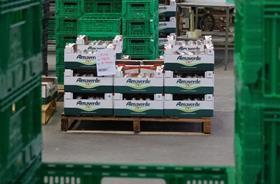
Italian co-operative Apofrut Italia sold more fresh produce and generated higher sales during 2015, generating a considerably larger net profit for the year compared with the previous 12 months.
The group said its combined fruit and vegetable sales for the year were €260m, notably higher than the €231m it reported for the previous 12 months.
Crucially, it posted a net profit of €527,000, significantly larger than the €156,000 achieved in 2014 and a slight improvement on the €523,000 made in 2013.
For the first five months of 2016, meanwhile, the group registered sales growth of 25 per cent, having handled a 35 per cent larger volume of product.
The co-operative’s growth has apparently been aided by guaranteeing supply through recent marketing agreements with apple companies SFTand Bio Meran, as well as a strategic export alliance with another fruit supplier, Terremerse.
In the meantime, a more general restructuring and efficiency drive prompted by challenging market conditions over the past few years has reportedly helped Apofruit to grow.
“This is a leap forward that stems from the co-operative’s growth, the entire group’s efficiency plan, our agreement with Terremerse to consolidate and specialise, and the aggregation of supply with SFT and Bio Meran,” the company said in a statement.
Key to the co-operative’s success has also been a commitment to branding on behalf of its 4,000 members, particularly with the premium label Solarelli – sales of which were up 21 per cent year on year – and organic marque Almaverde Bio, which saw its sales rise 17 per cent over the same period.
Opening new doors
The opening of new markets, meanwhile, especially since the start of 2016, has picked up pace for Apofruit.
According to the company, sales to overseas customers in January-May 2016 rose 218 per cent compared with the year-earlier period to €5.86m.
Commenting on the results, general director Ilenio Bastoni said: “The result confirms the validity of the commercial strategy we’ve adopted thus far and contrasts with a fall in fresh produce consumption across Europe and the lack of profitability that producers continued to see in horticulture during 2015.”
He added: “What has also evidently paid off is our specialisation, which has led us to become one of the leading producers of apples in Europe.”
Mirco Zanotti, president of Apofruit Italia, said the co-operative’s recent restructuring had enabled it to sell more produce and generate higher returns.
“This enabled us to limit the organisation’s general costs according to the goals we had set ourselves,” he said. “These results allow us to look at 2016 with a little more calm.”
Consolidation trend
Consolidation in the Italian fresh produce supply chain has been a major trend in the past couple of years.
Last May, Apofruit was one of several fresh produce companies in the country which came together to develop a system of aggregated supply.
The companies said they wanted to create value for producers and ensure the profitability of the supply chain by adopting new joint strategies, taking a model recently proposed for pears and potentially applying it to all products.






No comments yet